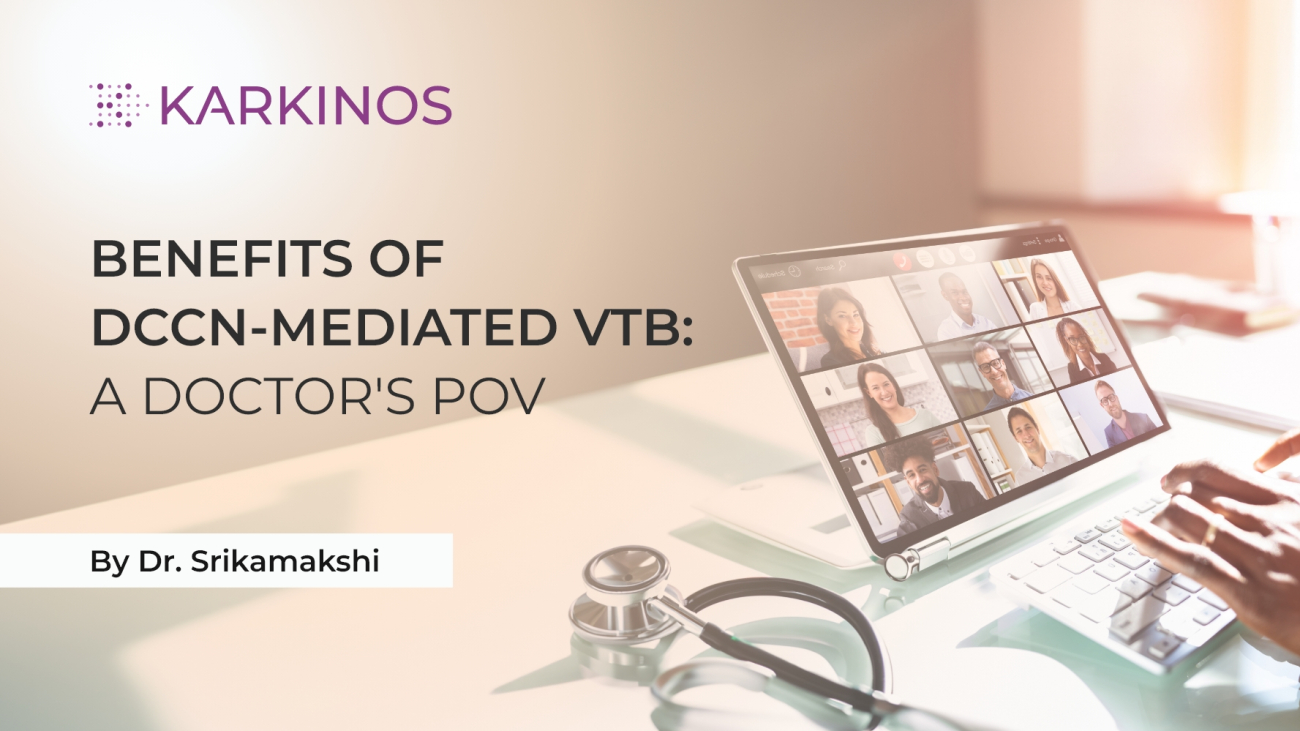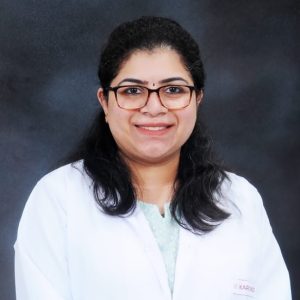Through a doctor’s lens: Advantages of Virtual Tumour Boards powered by the DCCN
By Dr. Srikamakshi Kothandaraman, Consultant Head & Neck Oncologist, Karkinos Healthcare
Physicians and oncologists, these days, have increasingly started adopting the virtual Multidisciplinary Tumour Boards (vMTBs). We are convinced that high-quality personalised treatment recommendations can be achieved by convening over a virtual platform and tangible results in patient experiences have been felt by physicians partaking in such discussions.
A clinical study by researchers from Rutgers Cancer Institute of New Jersey discovered that physician attendance at tumour board reviews increased by 46% when an in-person multidisciplinary tumour board was made virtual. Also, the research discovered that patient case presentations were faster, with a 20% increase compared to in-person tumour boards.
At Karkinos Healthcare (KH), Virtual Tumour Boards (VTBs) have been widely adopted and I am fortunate to be included in many such virtual decision-making discussions that have had many successful treatment outcomes and have also had lasting impressions of these tech-aided tumour boards. Another impressive feature that accentuates the positive impression is the powering of the VTBs by Karkinos’ proprietary operation model – the Distributed Cancer Care Network (DCCN).
The beauty of the DCCN’s concept is that the company, though spread across the length and breadth of the country, can function together as a single unit. The hospitals and laboratories are connected through a hub-and-spoke model and centrally managed by the command centre. One of the threads that holds the DCCN together, to deliver and maintain global standards of cancer treatment, is the Virtual Tumour Board (VTB) or Multidisciplinary Tumour Board (MTB) meetings. Any doctor who attends virtual tumour boards (VTBs) will be able to understand and appreciate my belief on this. Let me elaborate in this blog on how I have started to appreciate the advantages of VTBs.
A Multidisciplinary Tumour Board (MDT) Discussion is a corner-stone in the management of cancer patients’ treatment in any tertiary-care oncology centre. How this generally happens is that, all the oncologists at a particular tertiary care centre come together at a pre-fixed day and time every week (usually) at a particular meeting room in a hospital premise, and all the new cancer patients encountered since the last MDT are discussed in-person by them. The discussion aids in arriving at a consensus and a treatment plan is formulated to help patients overcome their cancer condition.
Predominantly, oncology centres will have more than one doctor in each subspecialty of oncology, including, but not limited to, surgical, medical, and radiation oncologists. This implies that beyond mere suggestions or opinions, a more refined treatment plan is attainable over a thorough discussion and debate, ultimately resulting in the determination of the best approach for each patient’s cancer management.
Considering the modus-operandi of Karkinos Healthcare, which as a company is determined to take cancer-care closer to home for our Indian patients, having a Virtual Tumour Board, where all the oncologists participate in the MDT discussion virtually, is the most logical way to accomplish its mission.
Oncologists at Karkinos are spread out across the country and mostly have to handle the cancer patients in each region independently. In this scenario, having a similarly qualified peer, vetting their treatment plan virtually, provides scientifically-validated credence and credibility to the same. And bearing the same geographic layout of Karkinos’ doctors in mind, these VTB discussions are opportunities for them to discuss a particularly difficult case, which has put them in some kind of a dilemma. They find a comrade (or in-fact many comrades) here, who would have otherwise been available only as in-person at a conventional oncology hospital setup.
Kare360: The Super App for VTB convenience
Kare360 is Karkinos Healthcare’s Super App used for doctor consultation, teleconsultation, capturing longitudinal data of the patient and much more. This is a Web App or a Progressive Web Application, which can be opened in a browser on a laptop/desktop or mobile devices. The major advantage of this App is its ability to handle individuals with elevated high risk cancer prospects. Also, this App has the ability to unify data from different sources or citizen/patient touch points. Electronic Health Records, Patient health data, Radiology images, diagnostic test results can all be accessed on this App. Virtual Tumour Boards are done with the assistance of this App and also effective patient monitoring is possible with the App’s features to track and trace patient’s health data.
The list of patients to be discussed during the VTB is shared in advance with the team of KH doctors. All KH doctors make themselves available at the designated time and date to discuss each patient’s case on the Kare360 app’s virtual platform.
As Karkinos Healthcare has one of the best panels of globally-acclaimed doctors with rich experience and knowledge in oncology, and they being a part of the virtual tumour boards serves a tremendous advantage to the patients who come in contact with the organization. Looking at it from the patient’s perspective, each patient gets not just one ‘second opinion’ but several second opinions at one go!
Considering it from the treating doctor’s standpoint, it provides reassurance that we have formulated the most optimal plan for our patient, or it offers us guidance in achieving the same. It appears to be indeed a mutually beneficial situation for all involved, isn’t it?
These VTB meetings are recorded and stored for posterity as well. This provides medico-legal protection to the treating doctors and also allows them to revisit the discussion in case of any doubts that arise later.
The KareMitras who host and run the VTB, also ask each doctor who presents a particular case, to update the status of the patient after a week, which is informed to all the participants of the VTB. This ensures compliance to the plan made by all parties involved, and if not, the reason is made known. This way, the doctor is held accountable to implement the treatment plan decided on for the patient by the VTB, and everyone is aware of the treatment progress (or not) of the patient.
The beauty of the VTB, from my perspective (as a practising Oncologist), is that I get a window of opportunities each time I attend a VTB, to look into and understand the disease pattern and presentation at different geographic locations. One can understand how cultural and lifestyle habits and practices influence the occurrence and outcomes of cancers across different parts of the country. Also an understanding on how the literacy rate of a particular state influences the stage of disease at which the patient decides to consult the doctor for a check-up is known.
I have marveled at the understanding of how some government-initiated steps/rules have helped to curtail and bring down the incidence of certain cancers linked to specific-habits in those states and how the lack of which has made the statistics spike in others.
This kind of information is not something an oncologist at a conventional cancer centre would have easy/ready-access to; and he/she usually receives such understanding at a convention/conference where oncologists tend to attend a few times a year. At Karkinos, this is a weekly opportunity!
The treating doctor also gets the opportunity to sometimes get a different perspective to a particular case, more importantly on complicated cases, when there may be more than one right answer, and sometimes none! Certainly, this can be achieved through a traditional in-person Multidisciplinary Team (MDT) discussion as well. However, what sets the Virtual Tumour Board (VTB) apart and is typically unavailable in MDTs is the ability to record the discussion. This allows treating doctors to listen and comprehend the deliberations leading to a decision for a specific patient if they were unable to attend for any reason. Furthermore, it enables us to revisit the discussion for additional clarification when necessary.
Should the treating doctor be absent from the in-person MDT discussion, they would essentially have to accept the board’s decision as is, potentially without gaining a full understanding of the facts and considerations that contributed to that specific decision.
Even for a case which required a re-discussion in the VTB, I have seen first-hand how we were able to quickly access the previous VTB discussion details (again courtesy of the Kare360 application which permits real-time recording of each event / encounter of the patient) to see the difference in patient status between then and now and arrive at an informed decision smoothly. However, when a case is re-discussed in a conventional MDT, it is almost impossible to avoid a certain level of confusion (which I have experienced myself previously), about what was the patient status and discussion previously, and what is currently taking place. Quite a bit of back and forth happens, with many doctors requiring to see the patient details and reports for themselves from the records again, before a consensus decision is arrived at.
I trust you can now appreciate the remarkable aspects of VTB that Karkinos extends to all its partner hospitals, and consequently, to all its patients, without any extra charges. This commitment aligns with our principles and values of consistently delivering the utmost quality of care in the field of oncology.

 Head and Neck Surgical Oncologist at Karkinos Healthcare, Hyderabad. With a background in ENT (MS), she went on do a Fellowship in Head and Neck Oncology at Mazumdar Shaw Cancer Centre, under Dr. Moni Kuriakose, who is the Medical Director at KH.
Head and Neck Surgical Oncologist at Karkinos Healthcare, Hyderabad. With a background in ENT (MS), she went on do a Fellowship in Head and Neck Oncology at Mazumdar Shaw Cancer Centre, under Dr. Moni Kuriakose, who is the Medical Director at KH.